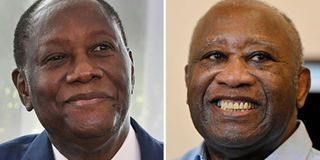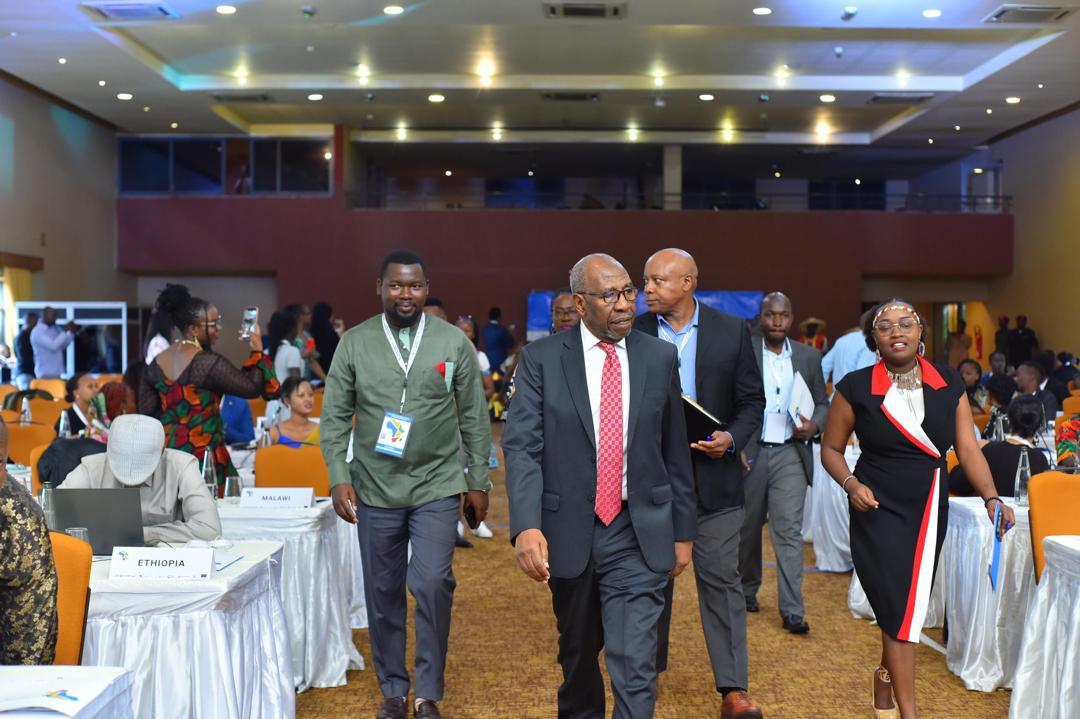Prime
Former Ivory Coast foes Ouattara and Gbagbo set for long-awaited meeting

This combination of file pictures created on July 21, 2021, shows Ivory Coast's President and then presidential candidate Alassane Ouattara (L) during and former Ivory Coast's President Laurent Gbagbo (R). PHOTO/AFP
What you need to know:
- The long-awaited talks are widely seen as a key to ending Ivory Coast's political crisis, as the two headed rival factions in a post-election conflict in 2010-11 that claimed several thousand lives.
In a key moment in Ivory Coast's turbulent politics, President Alassane Ouattara on Tuesday will meet his predecessor Laurent Gbagbo for the first time since the pair fought a post-election conflict a decade ago.
Gbagbo, 76, has leapt into the spotlight since returning last month from Europe, where he won a landmark case at the International Criminal Court (ICC).
In the last months of his stormy rule from 2000 to 2011, Gbagbo rejected defeat by Ouattara in a presidential ballot.
The conflict that broke out claimed more than 3,000 lives. After he was ousted, Gbagbo was flown to The Hague to face charges of crimes against humanity, of which he was eventually acquitted.
Commentators will be scrutinising Tuesday's meeting for signs of whether the two former rivals have buried the hatchet, boosting hopes for national healing after bloody clashes last year.
But Gbagbo’s spokesman Justin Katinan Kone urged the public "not to make too much" of the meeting.
"This is a courtesy visit to his elder... If it helps to ease the political atmosphere, so much the better," he said.
"Laurent Gbagbo is in a spirit of openness, dialogue and reconciliation," Franck Anderson Kouassi, spokesman for Gbagbo’s Ivorian Popular Front (FPI) party, told AFP on Monday.
"Meeting president Ouattara is exactly in line with our way of thinking."
"Dialogue in our country... will continue, because that is the government's will," said government spokesman Amadou Coulibaly.
A onetime international banker, Ouattara, 79, won a landslide victory in the last elections on October 31.
But the credibility of the win was undermined by an opposition boycott.
In the runup to the vote, scores of people died in clashes with police after Ouattara unveiled his controversial bid for a third term.
Moment for symbolism
In this context, Ouattara has officially welcomed Gbagbo's return, hoping it will ease tensions.
But the question is whether Gbagbo will stick to the script of statesman or prefer an active political role that may challenge Ouattara.
Gbagbo rose in the 1970s as a left-wing campaigner who helped end Ivory Coast's one-party system following independence from France in 1960.
His years in power were marked by rebellion, civil war, national divisions and repeatedly postponed elections, but he retains considerable grassroots support. His defenders portray him as a champion of the poor and oppressed.
The meeting on Tuesday will take place on Ouattara's turf -- the presidential palace.
Analyst Rodrigue Kone said the long-expected encounter "won't wipe out their huge differences but it takes their relationship further along."
Ouattara's side, he suggested, "sees the meeting as a recognition by Gbagbo of Ouattara's legitimacy -- something that hasn't been conveyed before in such a visible and official manner.
"Symbolically, it's very important."
Commentators are also watching the interplay among Ouattara, Gbagbo and former president Henri Konan Bedie, 87, three men who have dominated the political stage for decades.
On July 11, Gbagbo and Bedie — who were also once rivals — announced that they were united in the goal of forging "final and sustainable peace".
One lingering matter is a 20-year jail sentence for Gbagbo, who was convicted in absentia of "looting" the Central Bank of West African States (BCEAO) during the 2010-11 conflict.
Authorities have hinted that this sentence will be lifted.





